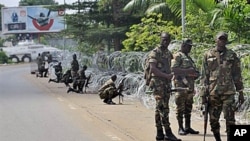The internationally recognized president of Ivory Coast is putting new pressure on incumbent Laurent Gbagbo to hand over power. Alassane Ouattara has asked West Africa's central bank to cut off Mr. Gbagbo's access to state funds.
The Dakar-based bank is used by eight countries in the West African Economic and Monetary Union. If the bank agrees to Mr. Ouattara's request, it could become difficult for Mr. Gbagbo's government to pay soldiers and civil servants.
A bank official said bank administrators will meet Wednesday in Togo's capital, but would not comment on whether they will discuss Mr. Ouattara's request.
The African Union, the United Nations and other international bodies have recognized Mr. Ouattara as the winner of last month's presidential election. However, Mr. Gbagbo refuses to accept the result and has defied calls to step down.
Tension remains high in the main city of Abidjan. Mr. Ouattara's would-be prime minister, Guillaume Soro, said Monday he and his supporters will take charge of government buildings later this week. Soro said he will take over state television on Thursday, and that his Cabinet will meet Friday in the official prime minister's office.
There has been no response to the comments from Gbagbo. Pro-Gbagbo troops temporarily blocked roads Monday, though, to the Abidjan hotel housing Ouattara. The troops finally let traffic through late in the day.
The power struggle has led to fears of renewed conflict in Ivory Coast, although officials on both sides have said they want to avoid war.
Ivory Coast is trying to recover from a 2002 civil war that left it divided into rebel- and government-controlled territories. The presidential election was meant to restore stability to the West African country.
Gbagbo has ruled Ivory Coast since 2000. His term officially ended in 2005, but he remained in office as elections repeatedly were postponed.
Some information for this report was provided by AP.




